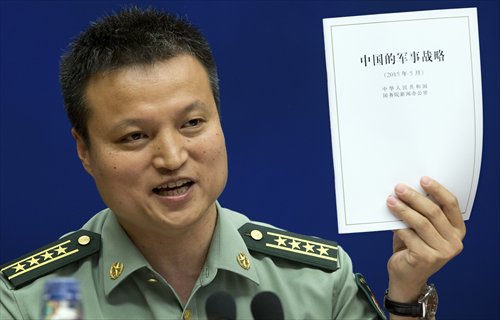MoD unveils military strategy
White paper expands focus to include open sea interests

China's Defense Ministry spokesman Yang Yujun holds up a report on China's military strategy during a press conference in Beijing on Tuesday. Photo: AP
China on Tuesday unveiled its first white paper on its military strategy, which attaches more significance to maritime interests and marine power in open seas amid increasing maritime threats, analysts said.
The 9,000-word white paper, China's Military Strategy, issued by the State Council Information Office, featured the first white paper on strategic defense and operation and tactical offense.
This is the ninth military white paper since 1998 when China began to publish white papers every two years. It reiterated that China adheres to "the principles of active defense," adding that China will not attack unless under attack itself.
"Some countries adopt preemptive strategies, emphasizing preventive intervention and taking the initiative in attack. Ours is totally different," said Zhang Yuguo, senior colonel with the general staff department of the People's Liberation Army (PLA), at the Tuesday press conference.
Being "active" is only a kind of means and "defense" is our fundamental purpose, he said.
A world war is unlikely in the foreseeable future and China remains in a period of strategic opportunities for development, the paper noted.
However, it warned of China's maritime rights and interests. "Some of its offshore neighbors take provocative actions and reinforce their military presence on China's reefs and islands that they have illegally occupied."
It also warned that "some external countries are also busy meddling in South China Sea affairs [and] a tiny few maintain constant, close-in air and sea surveillance and reconnaissance against China."
The Chinese foreign ministry has recently criticized surveillance activities by the US over the South China Sea.
The description of problems contrasts with those included in the 2013 version of the defense white paper, which mentioned some neighboring countries taking moves that "complicated" and "intensified" the situation, while singling out Japan for "making trouble" over the Diaoyu Islands in East China Sea.
Analysts pointed out that it is necessary for China to mark out its bottom line regarding its maritime rights and interests as the country needs enhanced capabilities to protect its increasing number of overseas interests.
China used to focus more on the army instead of the navy, which is also a result of a lack of maritime technology and experience. Eyeing a blue-water navy is not only a long-term strategy, but also closely related to China's future development, especially energy and resource development, according to Chen Zhou, a research fellow at the Academy of Military Sciences (AMS).
"It will also help enhance mutual trust in security with more transparency in military strategy," Chen added.
The paper said that the PLA Navy will gradually shift its focus from "offshore waters defense" to a combined strategy of "offshore waters defense and open seas protection."
The navy will continue to perform regular combat readiness patrols and maintain a military presence in relevant sea areas, the report said.
The Chinese navy kept troops close to land from the 1950s to the end of the 1970s under the strategy of inshore defense. Since the 1980s, the navy has realized a strategic transformation to offshore defensive operations.
"But it should be noted that China still deploys a defensive maritime strategy, which requires enhanced maneuver capability at open seas and joint operational capabilities in order to strengthen counterattack capability," said Zhang Junshe, a research fellow with the Navy Military Academic Research Institute.
The Chinese military will also strengthen international security cooperation in areas "considered especially important to China's overseas interests," which is believed to be the first appearance of such a term in these white papers.
Wen Bing, an associate research fellow at the AMS, who has also participated in previous white paper compilation, told the Global Times that apart from areas with Chinese investment, overseas interests also included energy and resource acquisition as well as strategic maritime channels.
"It is also a win-win when our protective measures can safeguard regional stability. It should be noted that China always abides by the law and respects the safety concerns of countries involved," Wen said. "According to international conventions, we often protect our overseas interests through cooperation."
The navy has carried out escort missions for about 6,000 fleets from China and other countries. Warships have been deployed to help evacuate citizens of China and other countries from conflict-hit Libya and Yemen in recent years.
According to Wen, another highlight of the white paper is to emphasize "winning informationized local wars," which signals that China will prioritize information-based warfare instead of relying on mechanized warfare."
Xinhua contributed to this story
Highlights of white paper:
Four critical security domains:
Oceans - Shifting focus to the combined one of "offshore waters defense and open seas protection."
Outer space - Opposing an arms race in outer space while vowing to secure its space assets.
Cyberspace - Expediting the cyber force development to tackle "grave security threats" within the digital realm.
Nuclear force - Stating China will never enter into a nuclear arms race.
Strategic tasks of PLA:
To deal with emergencies and military threats, and safeguard territorial land, air and sea
To safeguard China's unification
To safeguard China's security in new domains (such as the Internet)
To safeguard the security of China's overseas interests
To maintain strategic deterrence and carry out nuclear counterattacks
To participate in regional and international security cooperation
To fight infiltration, separatism and terrorism so as to maintain China's political security and social stability
To perform rescues, disaster relief and security while protecting China's rights and interests
Xinhua